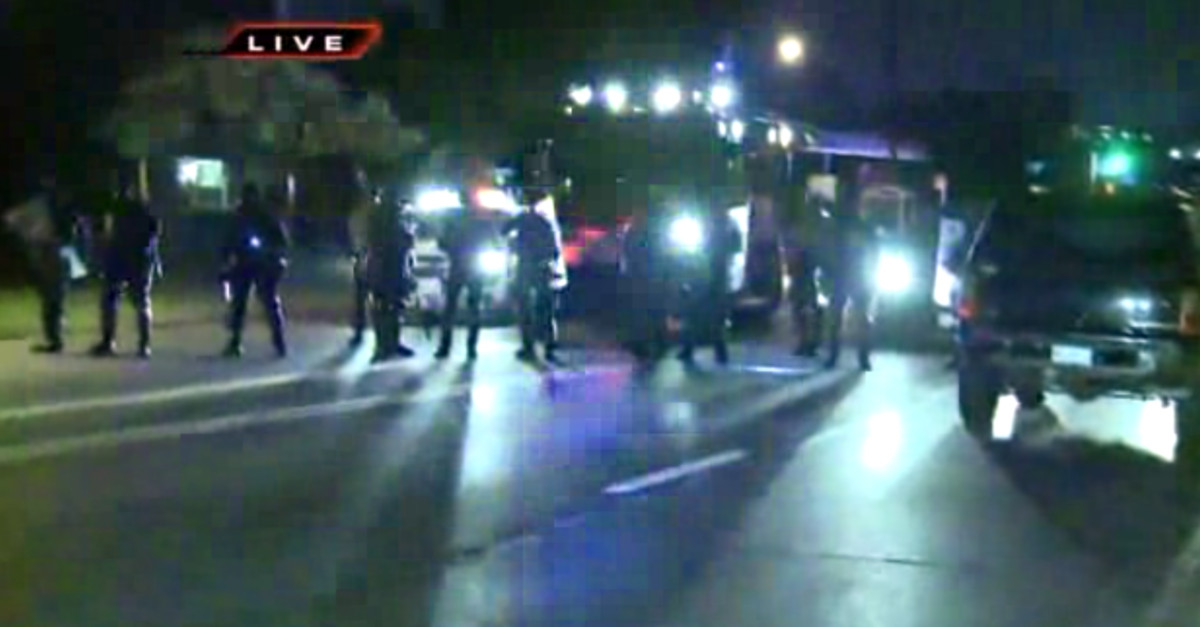The shooting death of the unarmed Michael Brown by Ferguson, Missouri Police Officer Darren Wilson on August 9 has lead to one positive thing: a long overdue conversation in the mainstream media about police militarization and brutality.
Videos by Rare
A few liberals started a self-righteous and wildly inaccurate side conversation about how libertarians just didn’t care about police issues. But mostly, we have had libertarians, the left, and the right coming together and nodding that yes, “something” needs to change here. Yet that’s where the easy agreement ends.
The various parties interested in law enforcement reform have some major , perhaps debilitating disagreements. We saw this division in the mixed response to the deployment of the National Guard to Ferguson. A few mainstream liberals celebrated. More skeptical folks looked askance at the even more literal-than-militarized-police military presence in town.
But that raised the important question of what role the Department of Justice and the U.S. government more broadly ought to play in reforming police departments.
Politicians at the federal level have chimed in. Sen. Rand Paul (Ky-R) and Rep. Justin Amash (Mich-R) strongly condemned police militarization in Ferguson. Assumed Democrat frontrunner for 2016 Hillary Clinton said not a word until August 28. And President Barack Obama began with platitudes, and then when public opinion would allow it, dipped his feet into the now luke-warm waters of acceptable debate.
Obama’s suggestions were, eventually, good ones: a reevaluation of the Pentagon’s 1033 program, which sends surplus war gear to even the smallest police departments, as well as the Department of Homeland Security’s similar source of funding is essential progress. Though let it be noted that this is not something Obama would have done without public outrage, and without other politicians — Republicans! — leading the charge.
Unfortunately, there are other worrying suggestions coming from progressives. Several members of Congress, the head of the AFL-CIO, and the executive director of the American Civil Liberties Union (ACLU) were just a few of the notables who signed a letter to Obama that requested he institute a federal “police czar” to institute their various suggestions for reform.
Here’s the problem with that suggestion. Pretty much every federal law enforcement agency – the FBI, the DEA, the ATF, is currently dripping with scandal and according to the latest Intercept/Edward Snowden leak, are even cozier with the NSA than we had thought humanly possible. Not to mention, our dear friend Attorney General Eric Holder has more than a few skeletons in his own deep closet — the Fast and Furious gunwalking scandal, for one. Basically, is the answer to police departments gone wrong another unelected, unaccountable DOJ official? And, can it not be, please?
Nobody should dispute that the police are doing a terrible job in policing themselves, and in embiggening public trust. Police departments, from the itchy trigger-fingered Albuquerque Police Department, to the too big for its britches NYPD have aptly demonstrated that a local problem can be a human rights issue that desperately needs to be remedied.
Hold on just a minute, though, progressives. Local police departments could have become bad without help from the federal government — but they didn’t. Bad state civil asset forfeiture laws are made worse by a DOJ incentive to make drug cases federal. That Ferguson war gear comes from the Pentagon and from the DHS. The motivation behind the former’s 1033 program was not terrorism, but the disturbingly-literal war on drugs.
And ah yes, the war on drugs — the greatest reason why U.S. prisons now contain 2.2 million people. The criminalization of everything else followed behind the insane policy of treating substances like existential threats to the country. SWAT, to be fair, goes back farther than the official war on drugs. It was birthed by the LAPD, thanks to civil rights unrest. Yet, its ostensibly useful purpose has mostly been ignored in favor of treating suspected pot dealers like they are Osama Bin Laden.
Real reform of police needs so many different things to happen.
Cameras, for one, can greatly help, but not fix the problem.
Reform cannot happen without abolishing myriad laws, drug ones in particular but also draconian laws that punish nonviolent gun “crimes.”
Challenging Supreme Court cases which give cops the benefit of the doubt in use of lethal force, or instituting no-knock raids is a must.
Prosecutors, too, need to step up to the plate and be willing to indict police officers suspected of wrongdoing.
Juries and the public at large need to hold police to higher standards.
Earlier this year, the acquittal of three cops charged in the death of Kelly Thomas demonstrated that even if police get as far as a second degree murder charge, there is no reason to think they will be convicted.
Exhausted yet? Yeah, me too. This is not a simple problem. The letter to Obama contained good suggestions such as more community police, so that towns and cities don’t see police departments as aggressive, outside forces. Checking bias in policing is also important. The minority-skewed numbers in the NYPD’s controversial stop and frisk program is just instance of this.
On the other hand, though too-blatant bias in law enforcement should never be tolerated, the letter to Obama is strangely optimistic in its suggestion that DOJ oversight of diverse hiring and racial bias training will solve our justice problem. What is easier — the DOJ instituting a color-blind police force by official mandate, or actually abolishing the laws that pack the real punch behind our mess of a justice system? Hard to say, but the latter would actually work work.
None of this is to say that the letter to Obama is entirely off the mark. Only that sincere progressives should be careful about cheering any and all incursions by the federal government. Local police oppression is bad enough. For decades, we have had the federally-subsidized version, which is always much more difficult to uproot.



